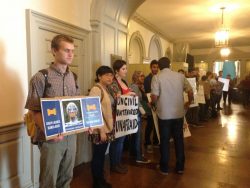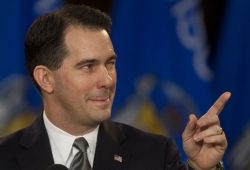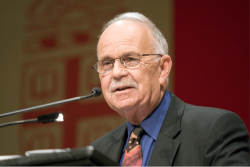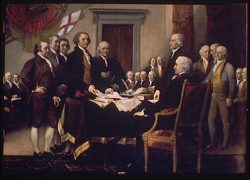Peter Wood is president of the National Association of Scholars and author of “1620: A Critical Response to the 1619 Project.”

The annual controversy over books assigned to freshmen as summer reading is upon us. Spoiler alerts. Odysseus makes it home. Hamlet dies. The Whale wins. Oh, not those books. We are talking more about White Girls (by Hilton Als, 2013) and Purple Hibiscus (by Chimamanda Ngozi Adichie, 2003). White Girls, as one reviewer puts it, is “an inquiry into otherness” by a […]
Read More
When I was in college I got a job one summer blasting, scraping, and sanding the corroded sides of dry-docked ships. It sounded like nasty, if well-paid, work. But before I could don gloves and mask in my war on barnacles, some union called a strike and my job was wiped out. I ended up […]
Read More
The AAUP—the American Association of University Professors—held its annual Conference on the State of Higher Education at the Mayflower Hotel in Washington, D.C. June 10-14. A few subway stops away, the Heartland Institute held its tenth International Conference on Climate Change at the Washington Court Hotel, June 11-12. I suspect that I am the only […]
Read More
Kevin Carey is convinced that online learning has created a watershed moment in the history of higher education. Not since Johannes Gutenberg assembled an ensemble of movable type, meltable alloy, oil-based ink, and a screw press in 1439 has there been such a moment—or so says Carey in his new book, The End of College: […]
Read More
The movement to impose a boycott on Israeli universities, to get colleges to divest from Israeli companies, and to impose other sanctions on Israel—the BDS movement (boycott, divest and sanction)—was launched in 2005 by a collection of Palestinian organizations. Over the last decade it has gathered significant support in American higher education, but the enthusiasm of […]
Read More
“Dignity” has been taken out for another walk around the block. In February 2014, I wrote an essay on Minding the Campus in which I commented on Attorney General Eric Holder’s speech to the Swedish Parliament, wherein he spoke of his nation’s commitment to the “dignity” of “every human being.” Over the last couples of […]
Read More
Wisconsin Governor Scott Walker just made an unforced error. He proposed—then backed away from—a change in the mission statement for the University of Wisconsin. I admire Walker and view him as among the more attractive candidates for the Republican nomination. And in that spirit, I’d like to offer him some friendly advice on a potentially […]
Read More
On January 14—a Wednesday—Duke University announced its decision to broadcast a Muslim call to prayer (the adhan) on campus at 1:00 every Friday afternoon. An uproar ensued, fueled in part by Franklin Graham (son of Billy Graham) writing about the decision on his Facebook page. The next day, Duke backed down, canceling its plan to issue the amplified adhan from […]
Read More
As examples of what my academic field, anthropology, has sunk to, here are four responses to the shooting and riots in Ferguson appearing in the current issue of Anthropology News. Each is a retelling of what might be called the left’s canonical myth of Ferguson: facts submerged in a sea of fiction. Pem Davidson Buck, […]
Read More
“Be the difference” is the motto of Marquette University, the generally not-very-newsworthy Jesuit university in Milwaukee. Marquette is in the news now for reasons that it cannot be very happy about. First a teaching assistant at the Catholic institution, Cheryl Abbate, a doctoral student in philosophy, was caught on tape earlier this year giving a […]
Read More
The post-Ferguson and post-Garner racial agitation has led to a wave of violent rhetoric and actual violence in the United States. Street protesters have called for “pigs in blankets,” declaring, “Arms up, shoot back,” and asking, “What do want? Dead cops. When do we want it? Now.” This rhetoric has campus amplifiers. Is the infatuation with violence […]
Read More
Many colleges and universities have adopted data-mining to improve student retention and to channel students to courses and programs that the institutions judge most appropriate. The future of higher education is here and it is, in spirit, benignly totalitarian. Goldie Blumenstyk, writing about it in the New York Times, (“Blowing Off Class? We Know”) emphasizes […]
Read More
American college students these days seem to divide by moral temperament into two very different cohorts. On one hand, a large number of students prize the freedom to do and say what they want and deeply dislike the constraints of external authority. On the other hand, a large number of students prize social control as […]
Read More
At the invitation of the Alabama chapter of Eagle Forum—Phyllis Schafly’s pro-family conservative organization—I flew to Birmingham last week to give a talk on the Common Core K-12 State Standards. Alabama was one of only a few states I had never set foot in. When I mentioned that to an elderly gentleman I met at […]
Read More
Whatever their ostensible subjects, Stanley Fish’s books tend to be about Stanley Fish. His new one, Versions of Academic Freedom, extends the conceit. Which is not to say that the book is only a “Version of Stanley Fish.” It is also a succinct, well-informed, and often elegant essay. Fish’s great talent is compression. In this […]
Read More
About 400,000 people assembled yesterday along Central Park West and marched down though Columbus Circle, to Midtown, and then east to the United Nations. Billed as “The People’s Climate March,” the event was intended to focus the attention of national leaders in town for the United Nations Climate Summit, which starts on Tuesday. Some 50,000 […]
Read More
For years, Bill Bennett, former U.S. Secretary of Education, has avoided taking a position on the Common Core K-12 State Standards. But yesterday he declared himself in favor. His essay in The Wall Street Journal, under the headline “The Conservative Case for Common Core,” dwells on the idea that conservatives generally favor good books, shared […]
Read More
Here comes PTSS, the latest concoction in the crowded field of group grievance. That would be Post Traumatic Slave Syndrome, the invention of “Dr. Joy,” Joy DuGruy, billed as ” the nationally and internationally renowned” researcher and educator. I will venture a guess that PTSS hasn’t yet caught the attention of many readers of Minding […]
Read More
History News Network In 2012, the College Board released a new set of standards for the Advanced Placement United States History (APUSH) course. APUSH vanishes some figures who would seem indispensable to any basic history of the United States. This is American history seemingly without Benjamin Franklin, Thomas Jefferson, and James Madison. “Seemingly” is a key word. If you […]
Read More
The Republican National Committee adopted a resolution on August 8 criticizing the College Board’s new Advanced Placement U.S. History (APUSH) course and exam. The RNC called for the College Board to “delay the implementation” of APUSH for one year and convene a committee to draft a new framework “consistent with” the traditional mission of the […]
Read More
This article is third in a series on “the year that was” in higher education. The first two articles are here and here. Campus activism is, by and large, the world of make-believe. Whenever students occupy a president’s office, Tinkerbell is not far away. Whenever faculty demand a boycott, Professor Dumbledore winks at Professor Snape.
Read More
The College Board recently released its new AP U.S. History (APUSH) Curriculum Framework. It is, in many respects, a dispiriting document. A great deal of important U.S. history is given cursory treatment and some ideological themes are sounded rather loudly.
Read More
At the Copenhagen Climate Change Conference in December 2009, leaders from more than a hundred nations gathered to consider an agenda that included a massive transfer of money from developed countries to the Third World. The developed states were tagged to provide $130 billion by 2020 to help developing nations deal with the consequences of […]
Read More
National Association of Scholars How frequent are sexual assaults on campus? President Obama recently cited the estimate that one in five women enrolled in college suffer sexual assault by the time they graduate. The Bureau of Justice’s National Crime Victimization Survey, based on reported crimes, put the rate at 1 in 40. Reported crimes inevitably fall short […]
Read More
Stanford University’s board of trustees has voted to divest from the university’s $18.7 billion endowment all of its holdings in coal-based energy companies. The university, which is private, has not disclosed what holdings these are, their market value, or the likely cost to the institution in foregone growth of its portfolio. The significance of the […]
Read More
When I was an undergraduate in the early 1970s at an elite liberal arts college, my anthropology professor assigned me as a paper topic, “Why do nearly all the students in the college wear blue jeans?” It was a surprisingly tough question. Looking around, virtually every student at the all-male college was wearing Levis or […]
Read More
How do the fine arts fit with the liberal arts? Not as well as one might think. Painting, music, photography, and other arts are often part of today’s jumbled curriculum, but they seldom have the academic status of disciplines such as English and art history. The situation is reversed when it comes to public status, where having a prize-winning […]
Read More
As a child I relished picking through rocks to find fossils of the lush tropical swamp that once covered my corner of southwest Pennsylvania. On trips to Ohio I collected specimens of the briny brachiopods that littered the floor of an inland ocean. Climate changes. I knew that by age seven. Whether it is changing […]
Read More
My friend Sol Stern has published a rejoinder here to two essays I recently published about the Common Core K-12 State Standards. Sol had quite a bit to say and I have replied point by point in an essay on the National Association of Scholars website. What follows is an abbreviated account. Sol makes, by […]
Read More
Changes in the SAT, announced on March 5 by the College Board, adjust the test to the ongoing decline in the nation’s public schools. The new test lightens vocabulary and math and eliminates the penalty for bad guessing. The new SAT grows out of and accommodates the Common Core State Standards, the controversial set of […]
Read More